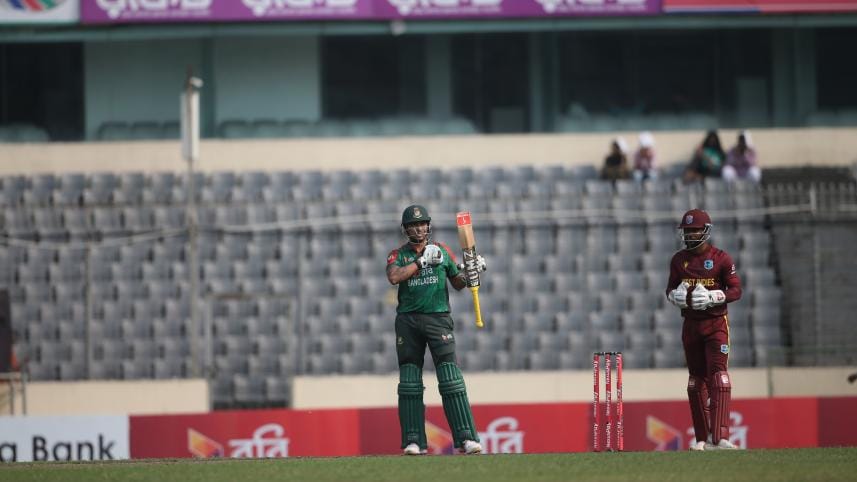‘Better to play my brand of attacking cricket’

Soumya Sarkar has a flair that sets him apart from most Bangladeshi batters -- something he showcased in the recent ODI series against the West Indies, where he struck a blistering 91 in the third ODI on a difficult Mirpur wicket. The 32-year-old spoke to The Daily Star's Abdullah Al Mehdi about his career, maintaining belief through ups and downs, his approach to batting, and his evolving role in the team. The excerpts of the interview are as follows:
The Daily Star (DS): In Mirpur, during the third ODI against the Windies, you batted aggressively on a difficult wicket. What was your secret?
Soumya Sarkar (SS): Not really a secret, but there have been gradual changes in my game. Against Afghanistan or the West Indies, I couldn't make some innings bigger, but the process was the same. The wicket was tough (in the West Indies series) – in the first match, I got out early, and in the second, I tried to stick around after early wickets fell, thinking I could cover later, but the pitch didn't allow that. Realising that I could get out any time on such a wicket, I felt it was better to play my attacking brand of cricket in the last game.
DS: Despite thinking you might get out any time, you didn't seem confused about your shot selection.
SS: As I said, since the wicket wasn't good and I could get out anytime, I had to trust myself and play according to the line of the deliveries.
DS: Was there any special emphasis on footwork?
SS: No. Everyone has different footwork. I never tried to change mine. Some have big movements, some small. I just wanted to bring changes to my work ethic, practice, and other things.
DS: Have you tried anything different? Players often talk about "process," but it's different for everyone. What process brought you runs?
SS: Runs only give you confidence, nothing else. Sometimes you don't score even on good batting wickets because you're low on confidence, your footwork isn't right, or you're not connecting well. Runs bring positivity, which helps a lot.
DS: Do you follow the same process in ODIs and domestic cricket? How do you judge success and failure in terms of sticking to your process?
SS: Scoring runs gives confidence for the next game, but every innings is a new beginning. The next day, you face the first ball again, so you have to start fresh. In terms of process, a consistent routine increases your chances of success.
DS: You've been in and out of the national side. Even after scoring in ODIs against the West Indies, you were dropped for the T20Is. How hard is it to stay confident?
SS: It's the same for everyone. Whether senior or junior, when you return to the team, you have to adjust again to the setup and international cricket. If you start well, it gets easier, but if not, you can overthink. Players must fix things themselves and adjust.
DS: Do the first 10 deliveries in a game determine how you'll perform?
SS: Not exactly. It's your routine, and following up on it is what determines your chances of success. That's how confidence grows.
DS: You'll now play in the NCL. How much does your recent ODI form help?
SS: NCL has been good for me in recent years. I started well in the last match but got out to a good ball on 37. Four-day cricket is very different – red-ball cricket needs more practice and sticking to the process. But we don't always get that opportunity. I went straight from one-day to red-ball matches, which is tough. Even here in Mirpur, we get just a day of proper practice. You must find time yourself. If I can do that, I believe I can succeed more in red-ball cricket.
DS: What are your thoughts on Test cricket?
SS: I've always wanted to play Tests. When I played earlier, I didn't do badly overall. In some matches, especially against England, Australia, or West Indies on spinning wickets, big scores weren't possible. I fell behind, but I believe I could do better in Tests since the more experience you have, the better chances you have of doing well in this format.
DS: Earlier, you wanted to contribute as an all-rounder. What led you to focus on opening again?
SS: I've always been confident as an opener. I still bowl, but I don't get regular chances. Usually, I got the ball in tough situations, when main bowlers couldn't do much. If I had bowled regularly, things might've been different.
DS: Do you regret not becoming a full-time all-rounder?
SS: Not really. I'm established as a batter. Earlier, it was tough to be a third seamer — when I debuted, the team usually played one pacer and more spinners. Now we play three seamers, but back then it was different.
DS: Despite doing well in the third ODI, you weren't in the T20I side. Thoughts?
SS: Not really. If I get the call again, I'll go and play.
DS: You once said your batch hasn't become seniors even after 10 years. Do you still think so?
SS: I've played for 10 years, but players like Tamim bhai and Shakib bhai were also there during that time, so our names didn't come forward. When they left, juniors came in. There's no senior or junior now. If they had retired earlier, maybe we'd have been the seniors. But since we were in and out while they were still playing, that's why I said it.
DS: Do you feel your responsibility has increased now?
SS: Yes, obviously. In a team of 11, everyone has responsibilities. I always feel that as a player.



 For all latest news, follow The Daily Star's Google News channel.
For all latest news, follow The Daily Star's Google News channel.
Comments